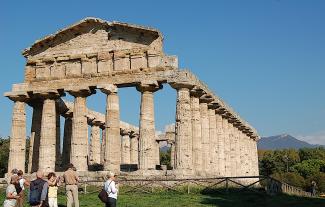
A Holistic Plan of Support
Commencing in summer 2020, doctoral students who matriculate in Classics will be fully supported by the University—with tuition, annual stipend, and individual health insurance—for as long as they remain in good standing, up to the University’s limit on registration. This guarantee of funding throughout one’s graduate career is an expression of the University’s and the Department’s commitment to the training and research of all its doctoral students.
Further information on the funding package may be found on the website of the Division of the Arts & Humanities.
Pedagogical Training
Doctoral students in Classics receive instruction in language pedagogy as well as the teaching of courses in translation, from resources within the Department as well as Chicago Language Center and the Chicago Center for Teaching. During their graduate career, students train as teachers in the first-year language curriculum in Greek or Latin; in the second-year language curriculum in the other language; and in one course on classical material taught in translation. Details regarding both training and teaching opportunities may be found in the Department’s Pedagogical Training Plan in the Graduate Handbook.
Additional Support at the Dissertation Stage
The Division of the Arts & Humanities has offers a number of competitive Dissertation Completion Fellowships for students who make particularly good progress through the program.
Additional Funding Sources
Fellowships from public or private agencies can enhance a student’s overall financial support. Applicants are encouraged to explore all available funding opportunities. The Division of the Arts & Humanities provides initial information on searching for external funding sources.
Fellowships and Travel Funding
Internal Fellowships
There are three internal fellowships available in the Department of Classics.
| Ephron Research Scholarship | Research-related expenses or For advanced students, to cover shortfalls in funding | Application Instructions |
| Daniel Shorey Fellowship | Travel abroad for study or research | Application Instructions |
| Boyer Fellowship | Travel abroad for research | Application Instructions |
External Fellowships
There are also a number of external fellowships and travel grants available to our students.
The Division of the Arts & Humanities provides grants and fellowships to graduate students. Students who intend to attend or participate in a conference or to travel for research in the United States or abroad should consider first the many options offered by the Division.
We especially encourage our students to apply for the following Divisional fellowship:
| Edward L. Ryerson Fellowship | Travel abroad to study the art and archaeology of the Greek and Roman worlds or Travel to conferences or exhibitions related to the art and archaeology of the Greek and Roman worlds | Application Instructions |
Students in the Department who apply for a Ryerson Fellowship should also send a copy of the application to the Administrative Assistant of the Department. These students are also eligible to apply for the Boyer Fellowship.
The Graduate Council offers grants from the Graduate Council Travel Fund to subsidise the cost of transportation and conference registration fees for students attending academic conferences and professional meetings. Each student is eligible to receive a grant from this fund once every three years.
UChicagoGRAD maintains a database of available internal and external fellowships for students across the University.
